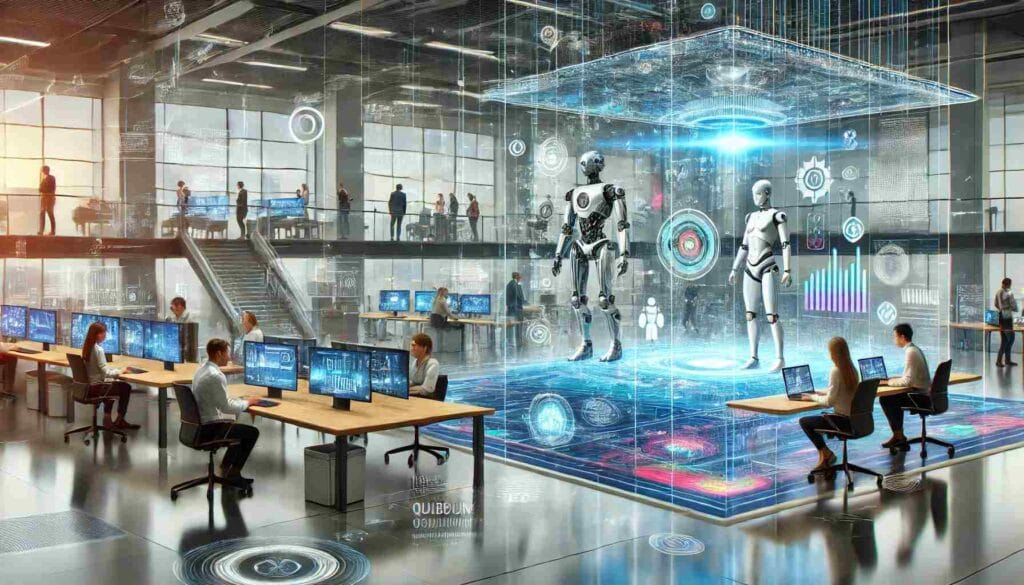The Transformation and Progressive Approaches for Future Jobs

The world of work is undergoing a dramatic transformation. With advancements in technology, artificial intelligence (AI), automation, and the integration of quantum computing, the future of jobs is being reshaped in ways previously unimaginable. The future workplace will not only look different but will also require new skills and adaptive strategies to meet the demands of emerging industries and work environments. This article explores the transformation of the workforce and the progressive approaches that will define future jobs.
1. Technological Advancements and Their Impact on Jobs
The rapid pace of technological advancements is significantly altering the structure of employment. Automation, AI, and robotics are expected to replace many routine and manual jobs across various industries. For instance, AI-powered systems are already capable of performing tasks traditionally done by humans, such as data analysis, customer support, and even complex problem-solving.
In parallel, quantum computing promises to revolutionize industries by solving problems that were once deemed too complex for traditional computers. With this comes the potential for entirely new roles and opportunities in fields like quantum programming, cybersecurity, and computational chemistry. Jobs in these areas will require workers to develop advanced skills in mathematics, programming, and physics.
2. New Types of Jobs and Skills
While automation and AI are expected to replace certain roles, they will also give rise to new jobs that did not exist in the past. These roles will be centered around innovation, creativity, and human connection—areas where machines still fall short.
For example, the rise of AI has led to a demand for AI specialists, machine learning engineers, data scientists, and ethical technologists. Moreover, as remote work becomes increasingly prevalent, roles related to virtual collaboration, digital communication, and cyber management are also on the rise. Digital nomads, remote project managers, and online learning facilitators are just a few examples of professions gaining traction.
In addition, soft skills such as emotional intelligence, leadership, and problem-solving will be in high demand. The ability to collaborate effectively with AI systems and navigate complex, interdisciplinary challenges will be crucial in the workforce of the future.
3. Reskilling and Upskilling the Workforce
The transition to new types of jobs necessitates a focus on reskilling and upskilling. The future workforce must be equipped with the ability to adapt to rapidly evolving technologies. Lifelong learning will become the standard, with continuous professional development being essential for career success.
Governments, businesses, and educational institutions will need to collaborate to provide accessible training programs. This includes initiatives to teach digital literacy, coding, data science, and other technical skills, along with fostering creativity, emotional intelligence, and problem-solving abilities. By empowering individuals with these skills, workers will be better prepared for the future job market.
4. Flexibility and the Rise of Remote Work
One of the most profound shifts in the future of jobs is the increasing flexibility in work arrangements. The COVID-19 pandemic accelerated the adoption of remote work, and this trend is expected to continue. As companies realize the benefits of a remote or hybrid workforce, employees will have more freedom in choosing where and how they work.
This shift will create opportunities for individuals to balance their professional and personal lives more effectively. In addition, it will open up employment opportunities to a global talent pool, allowing businesses to tap into diverse skill sets and cultural perspectives.
5. The Role of Ethics in Future Jobs
As AI and automation become more integrated into daily life, ethical considerations will play a crucial role in shaping future jobs. There will be a growing demand for professionals specializing in AI ethics, privacy, and data protection. These experts will ensure that AI systems are developed and deployed responsibly, mitigating potential biases and safeguarding users’ rights.
Ethics will also come into play as organizations embrace diversity and inclusion initiatives, ensuring that the future workforce reflects a broad range of experiences and perspectives. Social responsibility and sustainability will increasingly influence business models, with companies expected to contribute to solving global challenges, such as climate change and inequality.
6. Entrepreneurship and Innovation
The future of jobs will also see a rise in entrepreneurial endeavors. As technology enables individuals to work more independently, the barriers to starting a business or launching a new project will continue to diminish. Many workers will transition from traditional employment to becoming entrepreneurs, creating their own opportunities and pursuing their passions.
In fact, industries such as tech startups, digital content creation, and online consulting are already booming. Entrepreneurs will need to embrace innovation, agility, and creative thinking to succeed in an increasingly competitive global marketplace.
7. The Importance of Mental Health and Well-being
In an era of increasing work demands, balancing technological advancement with human well-being will be essential. The future of jobs will require a stronger focus on mental health support, work-life balance, and creating positive work environments.
Employers will need to prioritize the well-being of their employees, offering flexible work schedules, mental health resources, and a culture of support. Additionally, as AI takes on more tasks, humans will be freed up to focus on work that is more meaningful, offering the opportunity for greater job satisfaction and fulfillment.
Conclusion
The future of jobs will be marked by dramatic transformations. While some roles will disappear due to automation and AI, new opportunities will arise in sectors we are only beginning to understand. To thrive in this future, individuals must remain adaptable, continuously develop new skills, and embrace flexibility. In doing so, they will not only survive but thrive in a rapidly changing world of work.
As we move forward, both individuals and organizations must work together to ensure that the future workforce is prepared to meet the challenges of an increasingly technological and interconnected world. By embracing change, innovation, and ethical practices, we can create a future that is inclusive, sustainable, and rewarding for all.
Source : Medium.com




